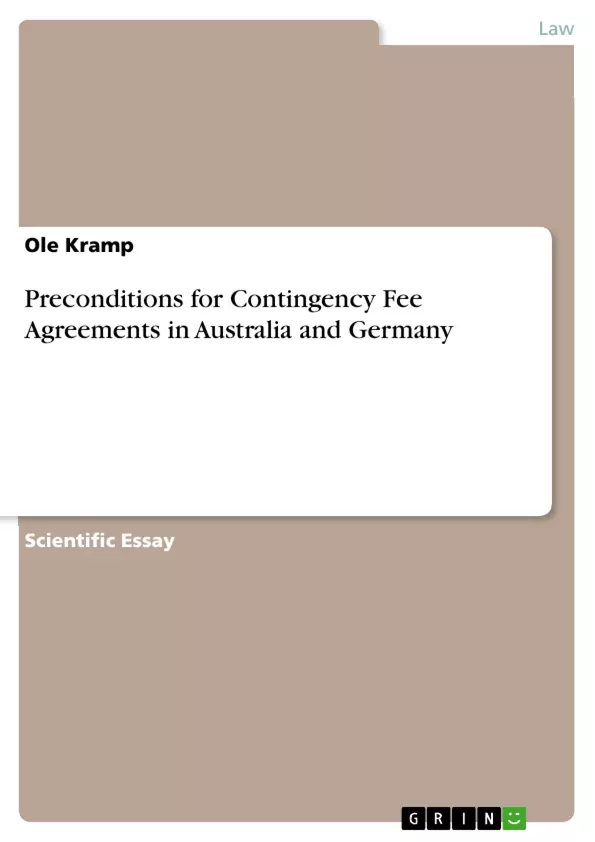This essay will show the advantages of comparative law in the development of appropriate preconditions for contingency fee agreements. After describing the current provisions concerning contingency fees in Australia and Germany, both the Australian and the German approaches will be critically examined concerning the preconditions of conditional cost agreements. The author concludes with the following findings: Sufficient information for the client is one of the most important elements when entering into a conditional cost agreement. The legislators in both countries have set up a good basis by implementing the requirements of written form and client information. The comparative look shows that the exclusion of criminal law and family law matters is unnecessary from a legal perspective and should lead to an amendment of the actual prohibition clauses in the Australian acts. Finally, it must be strongly recommended that Germany should follow the Australian example and implement a “cooling-off period” to address the client’s need for both sufficient information and effective action.
Inhaltsverzeichnis (Table of Contents)
- I INTRODUCTION
- II TERMINOLOGY
- III AUSTRALIA
- A Forms of contingency fees in Australia
- 1 Conditional fee
- 2 Uplift fee
- 3 No contingency fees in the narrow sense
- B Preconditions for contingency fees
- 1 Excluded matters relating to the conditional fee agreement
- 2 Written form and informing the client
- 3 Description of the conditions for successful outcome
- 4 "Cooling-off period"
- A Forms of contingency fees in Australia
- IV GERMANY
- A Historical development
- B Forms of contingency fees
- C Preconditions for conditional fees
- 1 Written form
- 2 Prerequisites concerning the content
- 3 Legal advice
- V COMPARISON
- 1 Written form and information of the client
- 2 Excluded matters relating to the conditional fee agreement
- 3 "Cooling-off period"
Zielsetzung und Themenschwerpunkte (Objectives and Key Themes)
This essay aims to highlight the benefits of comparative law in establishing appropriate preconditions for contingency fee agreements. It analyzes the current regulations governing contingency fees in Australia and Germany, critically examining the preconditions for conditional cost agreements in both jurisdictions. The essay will not delve into the constitutional implications of contingency fees or the broader political and sociological debate surrounding their necessity or desirability. Class action peculiarities are also excluded.
- Comparative analysis of contingency fee regulations in Australia and Germany.
- Critical examination of preconditions for conditional cost agreements.
- Differentiation of various types of contingency fees.
- Analysis of the written form and client information requirements.
- Discussion of "cooling-off periods" in contingency fee agreements.
Zusammenfassung der Kapitel (Chapter Summaries)
Chapter I: Introduction provides an overview of the essay's objectives and scope, focusing on the comparative legal analysis of contingency fee preconditions in Australia and Germany. It clarifies the limitations of the study, excluding constitutional implications and broader societal debates.
Chapter II: Terminology clarifies the various types of contingency fees, distinguishing between contingency fees in the broad and narrow sense, and further differentiating based on calculation methods (e.g., speculative fees, uplift fees).
Chapter III: Australia details the forms of contingency fees used in Australia (conditional fees, uplift fees), and examines the preconditions for these agreements, including requirements regarding written form, client information, excluded matters, and cooling-off periods.
Chapter IV: Germany presents a historical overview of contingency fees in Germany and outlines the different forms they take. It further analyzes the preconditions for conditional fees, focusing on written form, content prerequisites, and necessary legal advice.
Chapter V: Comparison provides a comparative analysis of the preconditions for contingency fees in Australia and Germany, specifically comparing written form and client information requirements, excluded matters, and the existence of cooling-off periods.
Schlüsselwörter (Keywords)
Contingency fees, conditional fee agreements, comparative law, Australia, Germany, legal fees, client information, written form, cooling-off period, uplift fee, speculative fee, conditional cost agreements.
Frequently Asked Questions
What are contingency fee agreements?
Legal fee arrangements where the lawyer's payment depends on the successful outcome of the case.
How do Australia and Germany differ in their approach to these fees?
Australia allows conditional and uplift fees with specific safeguards, while Germany has historically been more restrictive but has introduced specific preconditions.
What is a "cooling-off period" in Australian law?
A period during which a client can withdraw from a fee agreement after signing it, providing protection against rushed decisions.
Why is client information considered the most important element?
To ensure the client understands the risks and costs involved before entering into a "no win, no fee" type of contract.
In which legal matters are contingency fees typically excluded?
In Australia, they are often excluded in criminal law and family law matters, although the author argues this may be legally unnecessary.
- Quote paper
- Dr. Ole Kramp (Author), 2008, Preconditions for Contingency Fee Agreements in Australia and Germany, Munich, GRIN Verlag, https://www.grin.com/document/122363



